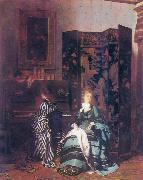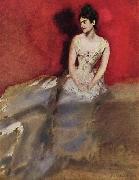Albert von Keller Olja Måleriet ReproduceringAll Albert von Keller Oil PaintingsAlbert von Keller (April 27, 1844 - July 14, 1920) was a German painter. He was born at Gais, in Switzerland; he studied at the Munich Academy under Lenbach and Ramberg, and must be counted among the leading colorists of the modern German school. Travels in Italy, France, England and Holland, and a prolonged sojourn in Paris, helped to develop his style. His scenes of society life, such as the famous "Dinner" (1890), are painted with thoroughly Parisian esprit, and his portraits are marked by the same elegant distinction. He was particularly successful in the rendering of rustling silk and satin dresses and draperies. His historical and imaginative works were as modern in spirit and as unacademical as his portraits. As of 1911, at the Munich Pinakothek was his painting "Jairi Töchterlein" (1886), while the Königsberg Museum contained his "Roman Bath", and the Liebieg collection in Reichenberg the "Audience with Louis XV", the first picture that drew attention to his talent. Among other important works he painted "Faustina in the Temple of Juno at Praeneste", "The Witches Sleep" (1888), "The Judgment of Paris", "The Happy Sister", "Temptation" (1892), "Autumn" (1893), "An Adventure" (1896), and "The Crucifixion". |
|||

|
|||
|
|
|||
|
||||||||
| Albert von Keller Albert von Keller (April 27, 1844 - July 14, 1920) was a German painter. He was born at Gais, in Switzerland; he studied at the Munich Academy under Lenbach and Ramberg, and must be counted among the leading colorists of the modern German school. Travels in Italy, France, England and Holland, and a prolonged sojourn in Paris, helped to develop his style. His scenes of society life, such as the famous "Dinner" (1890), are painted with thoroughly Parisian esprit, and his portraits are marked by the same elegant distinction. He was particularly successful in the rendering of rustling silk and satin dresses and draperies. His historical and imaginative works were as modern in spirit and as unacademical as his portraits. As of 1911, at the Munich Pinakothek was his painting "Jairi Töchterlein" (1886), while the Königsberg Museum contained his "Roman Bath", and the Liebieg collection in Reichenberg the "Audience with Louis XV", the first picture that drew attention to his talent. Among other important works he painted "Faustina in the Temple of Juno at Praeneste", "The Witches Sleep" (1888), "The Judgment of Paris", "The Happy Sister", "Temptation" (1892), "Autumn" (1893), "An Adventure" (1896), and "The Crucifixion". |
||||||||
|
|
||||||||
| Måleriet Identifieringen :: 91125 Chopin 1873(1873) Medium oil on panel Dimensions 85 x 69 cm (33.5 x 27.2 in) cyf |
||||||||
|
|
||||||||
| Måleriet Identifieringen :: 96587 4th quarter of 19th century 4. Viertel 19. Jh. Medium Deutsch: Leinwand Dimensions 202 X 98 cm (79.5 X 38.6 in) cjr |
||||||||
|
|
||||||||
|
| FÖREGÅENDE KONSTNÄR Nästa Konstnär | |||||||
|
|
||||||||
|
Albert von Keller Albert von Keller (April 27, 1844 - July 14, 1920) was a German painter. He was born at Gais, in Switzerland; he studied at the Munich Academy under Lenbach and Ramberg, and must be counted among the leading colorists of the modern German school. Travels in Italy, France, England and Holland, and a prolonged sojourn in Paris, helped to develop his style. His scenes of society life, such as the famous "Dinner" (1890), are painted with thoroughly Parisian esprit, and his portraits are marked by the same elegant distinction. He was particularly successful in the rendering of rustling silk and satin dresses and draperies. His historical and imaginative works were as modern in spirit and as unacademical as his portraits. As of 1911, at the Munich Pinakothek was his painting "Jairi Töchterlein" (1886), while the Königsberg Museum contained his "Roman Bath", and the Liebieg collection in Reichenberg the "Audience with Louis XV", the first picture that drew attention to his talent. Among other important works he painted "Faustina in the Temple of Juno at Praeneste", "The Witches Sleep" (1888), "The Judgment of Paris", "The Happy Sister", "Temptation" (1892), "Autumn" (1893), "An Adventure" (1896), and "The Crucifixion". |
||||||||
|
|
||||||||
|
KOMMA I KONTAKT MED Oss |







